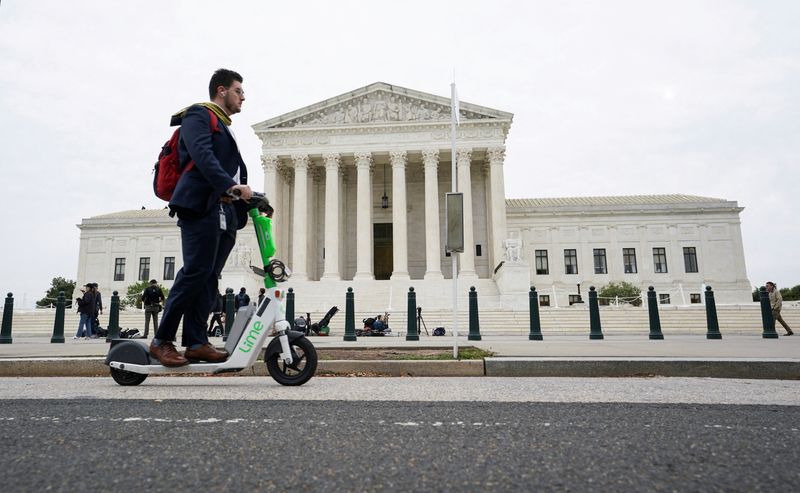By Andrew Chung and Nate Raymond
WASHINGTON (Reuters) - The U.S. Supreme Court on Monday appeared inclined to make it easier to challenge the regulatory power of federal agencies in disputes involving the Federal Trade Commission and the Securities and Exchange Commission.
The justices heard more than two hours of oral arguments, first in an appeal by Scottsdale, Arizona-based Axon Enterprise (NASDAQ:AXON) Inc after a lower court dismissed the Taser manufacturer's lawsuit contesting the constitutionality of the FTC's structure in a bid to counter an antitrust action related to its acquisition of a rival.
In a separate case, the justices considered the SEC's appeal of a lower court's decision reviving a challenge brought by a Texas accountant named Michelle Cochran to the legality of its in-house tribunal after it faulted her audits of publicly traded companies.
At issue in both cases is whether targets of an agency's enforcement action may challenge its structure or processes in a federal district court or must first endure the agency's administrative proceeding, which may be costly and time consuming.
Members of the court's 6-3 conservative majority appeared sympathetic to the agencies' challengers.
"What sense does it make for a claim that goes to the very structure of the agency having to go through the administrative process?" conservative Justice Samuel Alito asked Malcolm Stewart, a lawyer for the Department of Justice representing both commissions.
Chief Justice John Roberts said that given prior cases where the government lost challenges to agency actions, "Doesn't that underscore the need for a direct proceeding to raise the constitutional claim rather than waiting however many years before the agency?"
The FTC's role is to protect consumers against anticompetitive and fraudulent business practices. The SEC's job is to maintain fair, orderly markets and enforce investor protection laws.
'ADMINISTRATIVE STATE'
Paring back the regulatory authority of federal agencies - which can enforce laws and rules in important areas such as energy, the environment, climate policy and workplace safety - has been a major goal of many business and conservative groups, which complain about what they call the "administrative state."
The Supreme Court's conservative justices have signaled skepticism toward expansive regulatory power and the duty of judges, under Supreme Court precedent, to give deference to that authority. The eventual decisions in the two cases, due by the end of next June, could build on recent rulings by the court curbing agency authority.
The Federal Trade Commission Act and the Securities Exchange Act funnel judicial review of adverse agency orders to federal courts of appeal once those orders become final.
Liberal justices said that even in court rather than before agencies, litigants often must wait until the end to challenge on appeal a court's jurisdiction to hear a case.
"I don’t know why we should be permitting district court interference" in agency proceedings, Justice Sonia Sotomayor told a lawyer for Cochran.
Still, liberal Justice Elena Kagan made it clear the government's position was not solid. She told Stewart that of the three factors relevant to the case under a Supreme Court precedent, "two factors are pretty darn bad for you."
Axon sued the FTC in 2020 in federal court in Arizona following an investigation by the agency into its 2018 acquisition of Vievu, a rival body-camera provider.
The company said the agency acts as "prosecutor, judge and jury" in violation of the U.S. Constitution's Fifth Amendment guarantees of due process and equal protection under the law, and that its administrative law judges are unlawfully insulated from the president's power to control executive branch officers under the Constitution's Article II.
The San Francisco-based 9th U.S. Circuit Court of Appeals in 2021 threw out the case, ruling that under the FTC Act Axon must raise its claims in the administrative proceeding first.
In Cochran's case, an SEC judge found that she failed to comply with auditing standards, fined her $22,500 and banned her from practicing as an accountant before the commission for five years.
Cochran sued in 2019 to stop the enforcement action, like Axon contesting the SEC's in-house judges under Article II.
A federal judge in Texas threw out Cochran's challenge, but the New Orleans-based 5th U.S. Circuit Court of Appeals in 2021 revived the case.
(This story has been refiled to delete extraneous words in paragraph 1)
